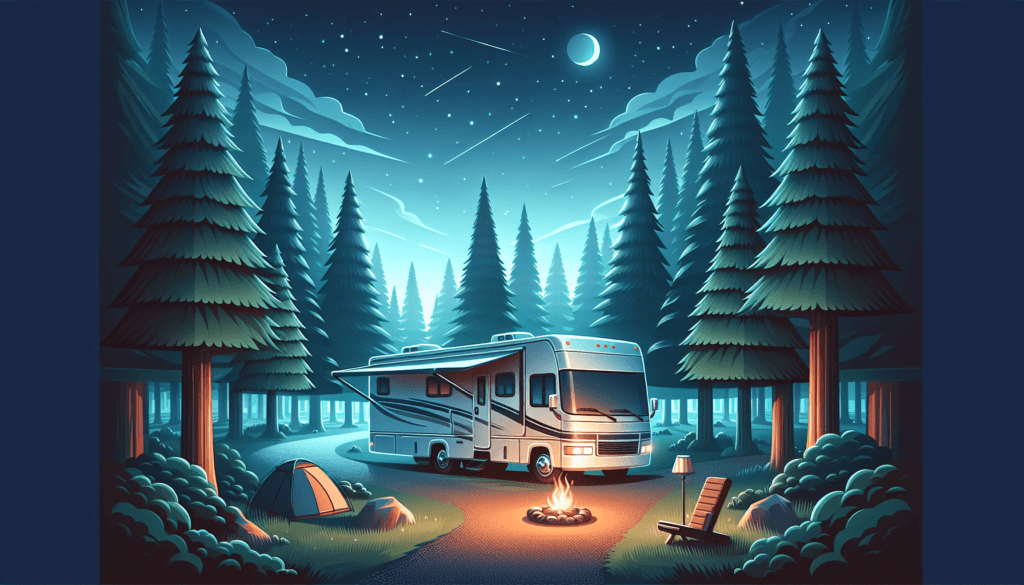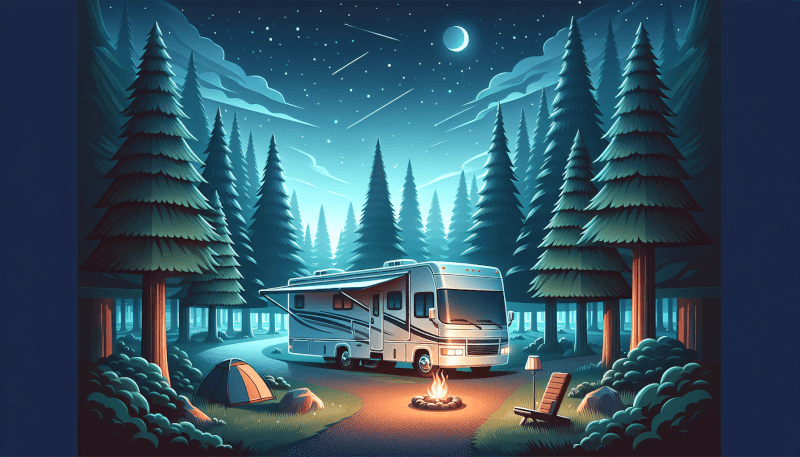Whether you’re new to the world of RV camping or a seasoned enthusiast, it’s always good to brush up on your etiquette skills to ensure a pleasant and respectful experience for everyone. In this article, we’ll explore some essential dos and don’ts of RV camping etiquette that will help you navigate social interactions and make lasting memories in the great outdoors. From proper campground behavior to respectful noise levels, we’ve got you covered. So grab your marshmallows and get ready to learn the best practices for a harmonious RV camping adventure.

Respecting the Campground
When you arrive at a campground, it is essential to familiarize yourself with the rules and regulations. Each campground will have its own set of guidelines, which may include restrictions on noise levels, campfire regulations, and waste disposal. By following these rules, you not only show respect for the campground and its staff but also contribute to the overall enjoyment of everyone’s camping experience.
Respecting quiet hours is crucial for maintaining a peaceful and relaxing environment for all campers. Typically, quiet hours are designated during the evenings and early mornings to ensure that everyone gets a good night’s sleep. During these hours, it’s important to keep your noise level to a minimum, whether it be conversations or music. By being considerate of others’ need for rest, you contribute to the harmonious ambiance of the campground.
Using designated camping areas is another way to respect the campground and its surroundings. These areas are carefully planned and allocated for campers to ensure the protection of natural resources and maintain a sense of order within the campground. By confining your camping activities to the designated areas, you minimize your impact on the environment and preserve the natural beauty of the surroundings.
Keeping your campsite clean and tidy is not only a matter of personal hygiene but also a way to show respect for the campground and fellow campers. Ensure that you properly dispose of waste in designated receptacles and clean up any trash or debris. This not only helps to maintain the cleanliness and aesthetics of the campground but also prevents attracting unwanted wildlife to your campsite.
Considerate Behavior
Being mindful of your noise level is important, not only during quiet hours but also throughout the day. Campgrounds are often close quarters, and excessive noise can disrupt the peace and tranquility for other campers. Keep conversations and music at an appropriate volume, taking into consideration the proximity of neighboring campsites. By being considerate, you create a more enjoyable camping experience for everyone involved.
When navigating through the campground, be respectful of other campers by avoiding walking through occupied campsites. Stick to designated paths, roads, or trails whenever possible. This helps to preserve others’ privacy and personal space, ensuring that everyone feels comfortable and secure during their camping trip.
If you bring pets to the campground, it is essential to keep them under control at all times. Follow any specific pet regulations set by the campground, such as leash requirements or designated pet areas. Be mindful of other campers who may have allergies or concerns about pets, and respect their space. Clean up after your pet, disposing of waste properly to keep the campground clean and safe for everyone.
Observing proper waste disposal is not only a matter of cleanliness but also a vital part of being considerate towards fellow campers and the environment. Utilize designated waste receptacles for garbage and recycling, following any guidelines provided by the campground. Avoid littering or leaving trash outside, as this can attract animals and create an unsightly and unsanitary camping environment.

Interacting with Fellow Campers
One of the joys of camping is the opportunity to meet fellow campers and build connections with others who share a love for the outdoors. When interacting with fellow campers, be friendly and respectful. Greet your neighbors with a smile and engage in polite conversation if they are open to it. Good manners and a positive attitude go a long way in creating a welcoming and inclusive atmosphere within the campground.
Before entering someone’s campsite, it is courteous to ask for permission. Some campers may appreciate visitors, while others may prefer privacy during their stay. By seeking permission, you demonstrate respect for their personal space and preferences. Remember that campers have different expectations and comfort levels when it comes to interactions, so always be mindful of their boundaries.
Excessive outdoor lighting can be bothersome and disruptive to fellow campers who are trying to enjoy the natural ambiance of the campground. If you need to use outdoor lighting, keep it to a minimum and avoid shining it directly into neighboring campsites. Consider using low-intensity or motion-activated lighting options to minimize the impact on others. Respect for others’ desire to experience the tranquility of the outdoors allows everyone to fully enjoy their camping experience.
During quiet hours, it is especially important to keep noise to a minimum. This includes refraining from loud conversations, music, or any activities that can disturb the peace and rest of fellow campers. By being mindful of the volume of your activities, you contribute to the overall serenity of the campground during these designated quiet hours.
Campfire Etiquette
Campfires are a quintessential part of the camping experience, providing warmth, ambiance, and a place to gather with friends and family. However, it is essential to follow campground regulations regarding campfires. Some campgrounds may have specific rules, such as designated fire pits or restrictions during dry seasons, to prevent accidents and protect the environment. Before starting a fire, familiarize yourself with these regulations and adhere to them accordingly.
When building a campfire, keep it at a reasonable size. A large fire may pose safety risks and create excessive smoke, which can be bothersome to neighboring campsites. Use only the amount of firewood necessary for your needs and avoid adding additional wood beyond what is required. By keeping your fire to a manageable size, you contribute to the overall safety and comfort of the campground.
Burning trash or prohibited materials in the campfire is both disrespectful and potentially hazardous. These actions can release harmful pollutants into the air and create an unpleasant odor for fellow campers. Always use proper firewood and avoid burning items like plastic, foam, or treated wood. By adhering to these guidelines, you contribute to a cleaner and healthier camping environment.
Before leaving your campsite, it is essential to properly extinguish your campfire. Use water or sand to completely douse the fire, ensuring there are no remaining embers or smoke. Stir the ashes to cool them down and double-check that the fire is entirely out. This is crucial in preventing the risk of wildfires and ensuring the safety of the campground for future campers.

Vehicle and Traffic Etiquette
Observe speed limits within the campground for the safety of both campers and wildlife. The designated speed limits are put in place to prevent accidents and maintain a peaceful atmosphere. Slow down and drive cautiously, especially in areas where pedestrians are present. By respecting the speed limits, you show consideration for the well-being of all campground visitors.
Yielding to pedestrians and other vehicles is an important aspect of responsible driving within the campground. If you encounter pedestrians, whether they are walking, biking, or pushing strollers, slow down and give them the right of way. Be patient and wait for a safe opportunity to pass. When approaching other vehicles, yield when necessary and follow any posted signs or directions given by campground staff.
Parking your vehicles properly is crucial to avoid encroaching on neighboring campsites. Pay attention to designated parking areas or pads and ensure that your vehicle is well within the boundaries of your campsite. Be mindful of access roads and do not block them or impede the flow of traffic. By parking considerately, you help maintain order and accessibility within the campground.
Avoid unnecessary vehicle noise, particularly during quiet hours or early mornings. Revving engines, honking horns, or playing loud music from vehicles can disrupt the peace and quiet that campers seek. Keep your vehicle noise to a minimum to ensure the enjoyment and relaxation of all campers within the campground.
Respecting Nature
Camping allows us to immerse ourselves in the beauty of the natural world, and it’s crucial to treat it with respect and care. One of the fundamental principles of camping etiquette is leaving no trace. This means cleaning up after yourself and leaving your campsite as you found it. Dispose of trash properly, pack out what you pack in, and leave nature’s beauty intact for others to enjoy.
Avoid damaging vegetation or wildlife when exploring the campground. Stay on designated trails and paths to minimize foot traffic on delicate plant life. Be mindful of any signs or barriers that indicate protected areas or habitats. Respecting the natural environment allows for its continued health and preservation.
When indulging in outdoor activities such as fishing or hiking, observe any regulations or guidelines provided by the campground. Respect fishing limits, catch-and-release policies, and any wildlife protection measures in place. By adhering to these rules, you contribute to the sustainability of the ecosystem and help ensure that future generations can also enjoy these natural wonders.
Excessive use of natural resources, such as water and energy, should be avoided. Be mindful of your water usage when showering, washing dishes, or doing any other activities that require water. Conserve energy by turning off lights, appliances, and electronics when not in use. Responsible consumption of resources minimizes our ecological footprint and helps protect the environment.

Safety Measures
Prioritize fire safety during your camping trip. Familiarize yourself with fire safety guidelines provided by the campground, such as the use of fire extinguishers or the location of fire hydrants. Have a clear understanding of how to extinguish a fire in case of an emergency. By being prepared and knowledgeable, you ensure the safety of yourself, fellow campers, and the campground as a whole.
Keep your valuables secure at all times. While campgrounds generally have a sense of community and camaraderie, it’s important to exercise caution and prevent theft. Lock your vehicles and store valuable items out of sight. Consider using lockboxes or safes for added security. By taking these precautions, you reduce the risk of loss or theft and can enjoy peace of mind during your camping trip.
Always keep an emergency kit handy. This should include essential items such as a first aid kit, flashlight, extra batteries, and a fully charged cell phone. Additionally, familiarize yourself with emergency procedures provided by the campground, such as evacuation routes or emergency contact numbers. Being prepared for unexpected situations ensures the safety and well-being of everyone in the campground.
Watch out for common hazards within the campground, such as slippery surfaces or uneven terrain. Pay attention to any warning signs or notices regarding potential danger. Use caution when walking on trails, especially after rainfall or in areas prone to moss or algae growth. By staying aware of your surroundings and taking necessary precautions, you minimize the risk of accidents and injuries.
Reservations and Check-In
To ensure a smooth camping experience, it’s advisable to make reservations in advance. Popular campgrounds can quickly fill up, especially during peak seasons, so booking ahead guarantees your spot. This allows campground staff to adequately prepare for your arrival and ensures that the campground can accommodate your needs.
Before making reservations, check the campground rules and policies. Familiarize yourself with any specific regulations, such as the allowed duration of stay or restrictions on certain activities. By understanding and adhering to these guidelines, you avoid any surprises or conflicts upon arrival.
Arriving and departing within designated times is important for maintaining the campground’s operations and allowing for a seamless transition between campers. Be mindful of check-in and check-out times and plan your trip accordingly. This courtesy towards campground staff and fellow campers ensures that everyone can enjoy their camping experience without unnecessary delays or inconveniences.
Follow the check-in procedures established by the campground. This may include registering at the office, providing necessary documentation, or receiving key cards or permits. By following these procedures, you help maintain efficiency and order within the campground’s administrative processes.

Children and Family Etiquette
Supervising children at all times is vital for their safety and the overall enjoyment of all campers. Children may be curious and adventurous, so it’s important to keep a watchful eye on them. Ensure that they follow campground rules and regulations and teach them about respectful camping behavior. By providing proper supervision and guidance, you create a safe and welcoming environment for families and children.
Teaching children about respectful camping behavior is an opportunity to instill values of consideration and environmental awareness. Explain the importance of following campground rules, disposing of waste properly, and respecting others’ privacy and space. By nurturing these values, you contribute to a community of responsible campers who appreciate and care for the campground and the environment.
Respect others’ privacy and space when it comes to camping, especially in close quarters. Avoid unnecessarily invading others’ campsites or encroaching on their personal space. Be aware of noise levels and avoid playing loud or disruptive games that may disturb neighboring campers. By respecting boundaries and maintaining a courteous atmosphere, everyone can enjoy their camping experience to the fullest.
Treat the Environment Responsibly
Using environmentally friendly camping products is a simple yet impactful way to minimize your ecological footprint. Choose biodegradable or eco-friendly alternatives whenever possible, such as biodegradable wipes or natural bug repellents. This reduces the amount of waste generated and the impact on the environment. By making conscious choices, you contribute to the long-term sustainability of the campground and its surroundings.
Dispose of waste properly by using designated receptacles for garbage and recycling. Sort your trash accordingly and follow any specific guidelines provided by the campground. Additionally, consider recycling options for items such as plastic bottles, aluminum cans, and paper. By actively participating in waste management efforts, you help minimize the environmental impact of your camping trip.
Conserve water and energy during your camping experience. Limit the length of showers, turn off taps when not in use, and use water-efficient appliances if available. Be mindful of energy consumption by turning off lights, electronics, and appliances when not needed. By reducing water and energy usage, you contribute to the overall sustainability of the campground and lessen the strain on natural resources.
Camping provides an opportunity to connect with nature and appreciate its beauty. By treating the environment responsibly, you ensure that future generations can also enjoy the wonders of the great outdoors. Remember that preserving nature’s gifts is a collective effort, and every action, no matter how small, makes a difference.


